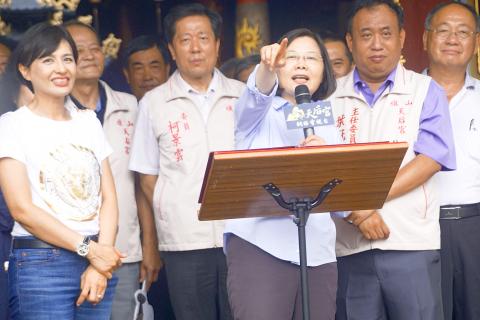President Tsai Ing-wen’s (蔡英文) approval rating has risen to 43 percent, up by 8.5 percentage points from last month, a public opinion poll released yesterday by the Taiwanese Public Opinion Foundation showed.
The survey aimed to assess public approval for Tsai and her administration on the third anniversary of her taking office, as well as to compare voter support for those vying to become the Democratic Progressive Party’s (DPP) and Chinese Nationalist Party’s (KMT) candidates in next year’s presidential election, the foundation said.
The survey found that 43 percent of respondents approved of Tsai, while 47 percent disapproved of her and her administration, foundation chairman Michael You (游盈隆) said, adding that public support for Tsai has been increasing.

Photo: Huang Chia-lin, Taipei Times
“The positive momentum for Tsai over the past two months is the result of her push to pass the same-sex marriage bill, along with her tough stance against the Chinese threat, her cooperation with the US and other efforts on foreign affair initiatives, and her focus on improving Taiwan’s national defense,” he said.
The poll found that 53 percent of respondents approved of Premier Su Tseng-chang’s (蘇貞昌) performance, while 37 percent disapproved.
“The 53 percent approval rating is Su’s highest since taking charge of the Cabinet in January. At least half of Taiwanese are satisfied with Su and his Cabinet’s overall performance and governance,” You said.
“The public has high expectations for the Tsai administration, and the high approval rating for Su and the Cabinet indicates that they quickly stabilized the political situation and gained the trust of the majority of the public,” he said.
Asked who they support in the DPP primary, 49 percent said they support former premier William Lai (賴清德) and 37.2 percent said they support Tsai, while 11.3 percent said they are undecided and 2.5 percent did not respond.
Asked to choose between Tsai and Kaohsiung Mayor Han Kuo-yu (韓國瑜) of the KMT for president, 47.1 percent said Tsai and 40.8 percent said Han, while 2.4 percent were undecided or chose not to answer, You said.
“Compared with last month’s numbers, Tsai’s approval rating has risen by 6.5 percentage points, while Han’s has fallen by 7.1 percentage points,” You said.
Lai had a larger lead against Han , the poll found.
“With Lai as the DPP’s candidate for president, he would beat Han by a margin of 14.5 percent, with Lai getting 53 percent of the vote and Han getting 38.5 percent,” he said.
Among the KMT presidential hopefuls, Hon Hai Precision Industry Co chairman Terry Gou (郭台銘) has narrowed the gap with Han to 2 percentage points.
The results showed that, while Han maintains the lead at 23.8 percent, Gou is behind him at 21.8 percent, followed closely by former legislative speaker Wang Jin-pyng (王金平) at 20 percent and former New Taipei City mayor Eric Chu (朱立倫) at 18.3 percent.
The survey, conducted by telephone on Monday and Tuesday last week, collected 1,085 valid samples from people older than 20 and has a margin of error of 2.98 percentage points.

The Ministry of Education (MOE) is to launch a new program to encourage international students to stay in Taiwan and explore job opportunities here after graduation, Deputy Minister of Education Yeh Ping-cheng (葉丙成) said on Friday. The government would provide full scholarships for international students to further their studies for two years in Taiwan, so those who want to pursue a master’s degree can consider applying for the program, he said. The fields included are science, technology, engineering, mathematics, semiconductors and finance, Yeh added. The program, called “Intense 2+2,” would also assist international students who completed the two years of further studies in

Former president Tsai Ing-wen (蔡英文) departed for Europe on Friday night, with planned stops in Lithuania and Denmark. Tsai arrived at Taiwan Taoyuan International Airport on Friday night, but did not speak to reporters before departing. Tsai wrote on social media later that the purpose of the trip was to reaffirm the commitment of Taiwanese to working with democratic allies to promote regional security and stability, upholding freedom and democracy, and defending their homeland. She also expressed hope that through joint efforts, Taiwan and Europe would continue to be partners building up economic resilience on the global stage. The former president was to first

Taiwan will now have four additional national holidays after the Legislative Yuan passed an amendment today, which also made Labor Day a national holiday for all sectors. The Chinese Nationalist Party (KMT) and Taiwan People’s Party (TPP) used their majority in the Legislative Yuan to pass the amendment to the Act on Implementing Memorial Days and State Holidays (紀念日及節日實施辦法), which the parties jointly proposed, in its third and final reading today. The legislature passed the bill to amend the act, which is currently enforced administratively, raising it to the legal level. The new legislation recognizes Confucius’ birthday on Sept. 28, the

The Taipei District Court sentenced babysitters Liu Tsai-hsuan (劉彩萱) and Liu Jou-lin (劉若琳) to life and 18 years in prison respectively today for causing the death of a one-year-old boy in December 2023. The Taipei District Prosecutors’ Office said that Liu Tsai-hsuan was entrusted with the care of a one-year-old boy, nicknamed Kai Kai (剴剴), in August 2023 by the Child Welfare League Foundation. From Sept. 1 to Dec. 23 that year, she and her sister Liu Jou-lin allegedly committed acts of abuse against the boy, who was rushed to the hospital with severe injuries on Dec. 24, 2023, but did not